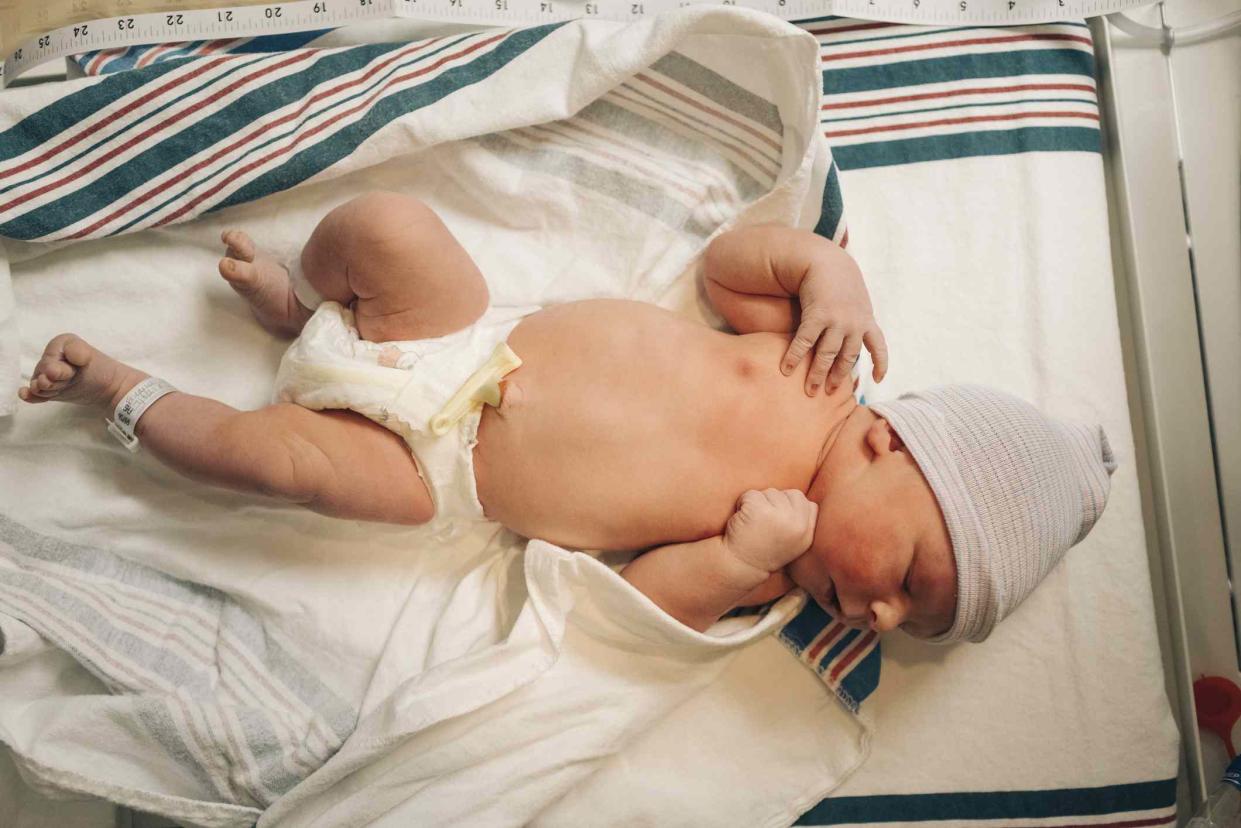Meconium Ileus

Michael Hanson / Getty Images
Medically reviewed by Jonathan B. Jassey, DO
The first bowel movement that a newborn passes is called meconium. It’s typically very sticky and thick. Meconium ileus is a bowel obstruction that happens when the meconium is abnormally thick and sticky, which then causes the small intestine, or ileum, to be blocked.
Many times, when this happens with an infant, they have cystic fibrosis (CF). Cystic fibrosis is a genetic condition present at birth that makes certain bodily fluids much sticker than they usually are. This increases the risk of meconium ileus.
This article discusses meconium ileus, its causes, treatment, and what to watch for.

Michael Hanson / Getty Images
Symptoms of Meconium Ileus
Sometimes this can be diagnosed while the fetus is still in utero via ultrasound or other imaging tests. However, it typically becomes symptomatic within hours of birth if it's not seen prenatally.
Early signs include:
A swollen belly that is sometimes severe enough to cause breathing issues
Green vomit
No meconium (bowel movement)
In order to definitively diagnose meconium ileus, an X-ray of the abdomen will be ordered to see if the baby has meconium in the intestines. A lower GI series may also be done. A contrast enema is given to your baby, and then the contrast can be seen on X-rays as it travels through the intestine.
Causes of Meconium Ileus
Many babies with meconium ileus have CF. It is estimated that 1 in 5 babies with CF is born with meconium ileus. Other causes can include a perforation (hole) in the intestine.
Some babies can have a similar problem in their colon (large intestine). This is different from meconium ileus and is called a meconium plug.
How to Treat Meconium Ileus
Once meconium ileus is suspected in a newborn, no food or liquid will be given orally. Instead, an intravenous line will be inserted into a vein to allow nutrition to be given. A nasogastric (NG) tube will be inserted through the nose into the stomach to get rid of excess air.
In order to break up the meconium, an enema with medications will be given. If this doesn’t work, surgery may be needed.
If surgery is needed, a bowel resection will be done. This is when the small intestine is brought to the surface of the abdominal wall, creating an ileostomy. This is temporary, and the bowel can be reconnected. You’ll be shown how to care for your baby's ileostomy before going home in one to two weeks.
Complications Associated With Meconium Ileus
A major risk factor for meconium ileus is cystic fibrosis. Many times, healthcare providers will suggest prenatal screening for CF. This helps the team prepare for any potential complications at birth.
If a perforation, or hole, occurs, surgery may be done immediately. This is so that the meconium can be removed and as much healthy intestine as possible can be saved. Sometimes areas of the intestine are damaged because of the blockage. If part of it was perforated, that area needs to be removed.
Infection is always a risk factor with surgery. Follow the instructions for keeping the ostomy area(s) clean and any wounds clean. Call your healthcare provider immediately if you notice any redness, pus, or anything out of the ordinary.
Are There Tests to Diagnose the Cause of Meconium Ileus?
There are tests to diagnose cystic fibrosis if that is suspected as the cause of meconium ileus. A newborn screening test is done with a heel stick blood draw to check for a chemical called immunoreactive trypsinogen (IRT), made by the pancreas.
Levels of IRT can also be high from prematurity or a stressful birth, so another test may be done in several weeks. Or, a sweat test may be ordered to rule out or confirm CF.
When to See a Healthcare Provider
Because meconium ileus has to do with the first bowel movement, you will likely be in the hospital when it is discovered. If you were discharged from the hospital or birthing center before the baby's first bowel movement (or gave birth in a different setting), monitor your baby for a bowel movement.
If your baby does not have a bowel movement within 24 to 48 hours of birth, call a healthcare provider. Seek medical attention if there are symptoms such as a swollen belly or green vomit.
Summary
Meconium ileus is a serious condition often seen in infants with cystic fibrosis but can occur in any newborn. Symptoms are typically seen within hours of birth and require monitoring and treatment.
If you are pregnant, talk with your healthcare provider about CF screening and any other potential screening that may be appropriate and what to watch for if you are at risk.
A Word From Verywell
Hearing that your newborn has a medical condition that needs immediate treatment can be scary. But meconium ileus is treatable. Talk with your baby’s healthcare provider about the treatment options. If surgery is necessary, they will let you know how to clean any ostomies and manage post-surgery recovery once your child goes home.

